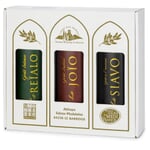Provençal olive oil package

Provençal olive oil package
- La Siavo: soft, slightly nutty and mild on the finish
- La Reïalo: fiery, strong and young, with a peppery finish
- La Joïo: intense aroma of almonds and red fruits
General Information
Provençal olive oil "La Reïalo"
The typical oil of the region is made from green olives (mainly of the Aglandau variety). It has aromas of fresh herbs and artichoke, is fiery, strong and young, with a peppery finish; recommended for pasta dishes, fish and salads. Extra virgin.
Provençal olive oil "La Joïo"
La Joïo is pressed from ripe olives of the l'Aglandau and la Tanche varieties. The latter, gentler, gives it a greater depth of aromas, of almonds and red fruits. Generally without spiciness, only very slightly peppery on the finish, it goes well with cooked vegetables and all kinds of hors d'oeuvres. Extra virgin.
Provençal olive oil "La Siavo"
This variety undergoes controlled fermentation of the olives, they are left to "coufry", to become overripe, to finally obtain the aromas of olive confit, mushrooms and cereals, even cocoa. For the ancients, this is the oil that "has the true taste of the olive". Very smooth, slightly nutty and mild on the finish. Goes well with leg of lamb, potatoes and even desserts. Virgin.
Provençal variations
Three different oils are produced by the Benedictines in Le Barroux. They have given them Provençal names to indicate the different flavors of these oils. This is achieved on the one hand by the selection of the olive varieties, but also by the degree of ripeness of the fruit and any fermentation that precedes the oil production. The latter only has flavor value if it takes place in a controlled and targeted manner. The oils are categorized as "extra virgin olive oil" or "virgin olive oil".
Olive oil from the foot of Mont Ventoux
Oil, wine and bread are ancient human foods and have a rich symbolic meaning in Christianity. It is therefore no coincidence that the Benedictine monks of the Provençal abbey of St. Madeleine in Le Barroux dedicate themselves to the production of these three foods and are the only monastery in France to operate an oil mill. Their region between the Dentelles and Mont Ventoux is rich in olive trees, which alternate with vineyards. The cultivation of olive trees also has a very practical significance for the monastery, as it not only creates an increasingly productive agriculture that can be cultivated for generations, but also provides a good field of activity for the monks' manual labor. They have deliberately chosen not to mechanize the olive harvest between November and December. This also protects the delicate fruit and increases the quality of the oil. As long as the plantations are still being established, olives have to be bought in from the surrounding area. How long the olives are stored between harvesting and processing depends on which flavours are to be preserved in the later oil through a different degree of ripeness or even controlled fermentation. The mill with its technical equipment is state of the art in oil milling; the small picture below shows the practical organization of the equipment. This facility is grounded, as it were, by its centerpiece, the heavy Tuscan stone mill made of granite, which corresponds to the centuries-old construction method in the twin arrangement of the two upper stones. Before the oil is pressed out of the olives, the fruit must be crushed under the stones. This olive pulp must not be heated under any circumstances, which could happen if the stones were to run too fast. For this reason, the grinding process is a leisurely affair and takes around 30 minutes per batch. The quality of the oil obtained in this traditional way can now be further improved using modern technology, namely by centrifuging the oil, which primarily separates out any water from the fruit. The oil is filtered as required. As oil production is a seasonal campaign activity, it is a good idea to only bottle the oil depending on the sales situation and to store the oil in large quantities in the absence of oxygen.
Ingredients and notes:
Sales description:
Extra virgin olive oil
Ingredients:
1st grade olives - obtained directly from olives using only mechanical processes. From controlled organic cultivation.
Storage and preparation instructions:
Store away from light, dry, cool (not in the fridge) and away from heat sources.
Origin / provenance:
France
Responsible food business operator:
Artisanat Monastique de Provence Abbaye Sainte-Madeleine 84330 Le Barroux France
Nutritional labeling - Provincial olive oil „La Reïalo“
| Nutritional values per | 100 g |
| Calorific value | 3768 kJ / 900 kcal |
| Fat | 99,8 g |
| hereof saturated fatty acids | 15,1 g |
| Carbohydrates | 0 g |
| hereof sugar | 0 g |
| Protein | 0 g |
| Salt | 0 g |
Nutritional labeling - Provincial olive oil „La Joïo“
| Nutritional values per | 100 g |
| Calorific value | 3768 kJ / 900 kcal |
| Fat | 99,8 g |
| hereof saturated fatty acids | 15,1 g |
| Carbohydrates | 0 g |
| hereof sugar | 0 g |
| Protein | 0 g |
| Salt | 0 g |
Nutritional labeling - Provincial olive oil „La Siavo“
| Nutritional values per | 100 g |
| Calorific value | 3768 kJ / 900 kcal |
| Fat | 99,8 g |
| hereof saturated fatty acids | 15, 1 g |
| Carbohydrates | 0 g |
| hereof sugar | 0 g |
| Protein | 0 g |
| Salt | 0 g |
Product Information
Article Number 26950
- La Siavo: soft, slightly nutty and mild on the finish
- La Reïalo: fiery, strong and young, with a peppery finish
- La Joïo: intense aroma of almonds and red fruits
The three varieties "La Reïalo", "La Joïo" and "La Siavo" in a gift box. One 0.5 l tin can each
Have a question?
If you have a question concerning this product you are welcome to contact us. For this your E-Mail program will open.
Contact Us
For advice, spare parts or special requests - our customer service will take care of your questions and concerns, personally and competently.
You can reach us from Monday to Friday at +49 2309 939095 or anytime at info@manufactum.com
Good Things from Monasteries
We bring living monastic culture from all over Europe directly to you. Tasty food, traditional care cosmetics and handcrafted goods that have long proven to be beneficial for body and soul in monastic life.
Good things from monasteries


